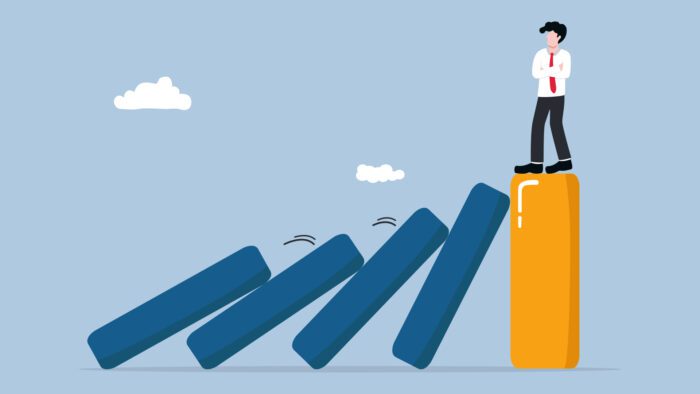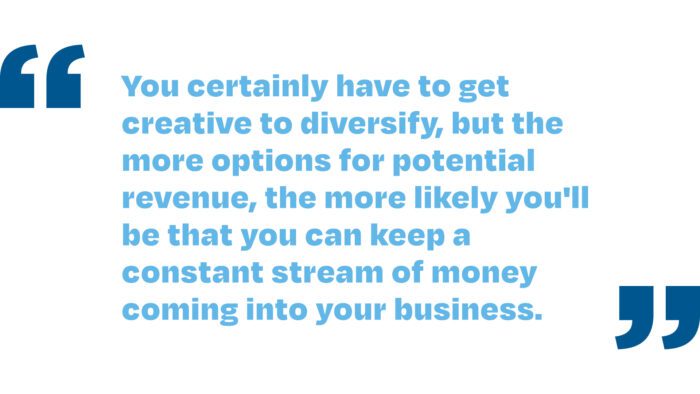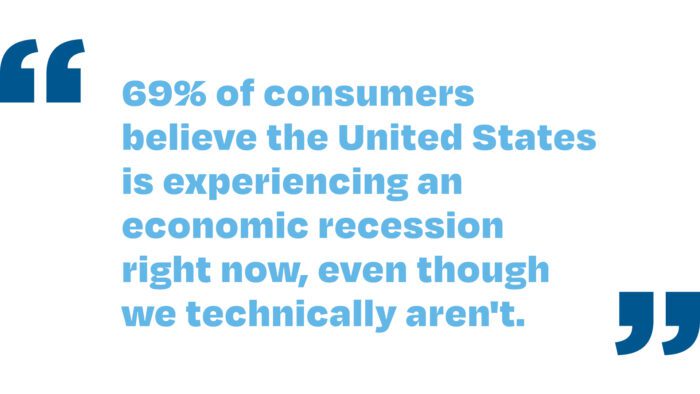
Owning a small business is not for the faint of heart. It takes long nights, weekends, holidays, a missed dance recital or two, and a lot of blood (paper cuts count!), sweat, and tears. And once that business gets up and running, and its revenue can support its costs and you or your family, there’s no better feeling. But, unfortunately, all of that hard work and subsequent success can come crumbling down given the wrong economic conditions, especially during a recession. Before you panic, take a deep breath. We’re here to help you learn how to prepare your small business for a recession so your hard work can continue to thrive no matter what the economy looks like.
It’s true that a recession forces some small businesses to close. This causes some to shrug their shoulders and lament, “There’s nothing I can do.” But they’re wrong.
It’s a misconception that an economy in the gutters will force all small businesses to close or suffer irreparable damage. In fact, there are a lot of things you can do to prepare your business for a recession that ensures it stays open – and even makes a profit.
We’re not saying it’s going to be easy, and we’re definitely not saying you’re going to be living large while other small businesses close up shop, but according to the Chief Operating Officer of Kapitus, Ben Johnston, nearly every company – including small businesses – follows the ups and downs of the economy. Meaning, whether you like it or not, you’re on the economy’s ride, and it’s always better to prepare for its inevitable climbs and drops for the best outcome possible before they happen. Plus, to sweeten the pot, an analysis by Harvard Business Review found that prepared companies in the 2009 recession had a compound annual growth rate of 17% after the economy recovered, compared to unprepared businesses. So, while the prepared may not live large during the recession, a prepared company tends to fare even better once the economy recovers.
So, before a recession ever reaches your doorstep, here are a few things your small business can do to prepare for an economic downturn.
How To Prepare Your Small Business For A Recession
Plan To Diversify
The first, and maybe the most important, thing you can do for your business in any market is to have multiple sources of income – or diversify your revenue streams. Think about it. If you’re a home-building company, what happens if no one can afford to build a home? Where will your income come from?
In niche markets with one specialized product or service, all it would take for the company to stall would be for the demand to stop. You can really apply that analogy to any company; if you sell yarn, if you sell birdhouses, if you sell anything, what would happen if consumers could no longer afford – or need – to buy from you? If this sounds severe, don’t take our word for it. Take the data’s. In a 2022 survey of 200 U.S. consumers, 30% said they were purchasing less, 24% reported spending more consciously, and 13% said they were trying to avoid spending money at all. That’s a 67% shift to more conservative spending habits!
This group also reported that when they did spend money, their main focus was purchasing goods from only the following categories:
- Essential Groceries and Food
- Rent, Mortgage, Housing Bills
- Essential Personal Care Products
- Medication and Health Care
So, unless you’re also a landlord, a doctor, big pharma, or a grocer, you’ll need more than 1 or 2 sources of income to combat that 67% shift toward the strictly necessary. That way, if one line of business slows down, you’ll still have other ways to make money.
How do you do it, you ask? The first step is to determine your business’s core competencies. What are the unique things your company does exceptionally well? What makes your organization stand out from all the others just like it? What are the pain points only you can address? Essentially, what are your strengths?

Next, you capitalize. The first thing any company can do is bring their services to an online space. If you don’t have an online store yet, a recession is a great time to start one. You can reach a wider audience and draw in new customers who may still be willing to spend on your nonessential product or service.
But aside from an online store or page (which, again, we urge you to do anyways), the next thing you’ll want to do is turn those strengths into currency. Let’s go back to the home-building example. Whether you’re a general contractor, construction worker, or everything in between, you have many valuable insights and skills from which other people could benefit. For instance, you can turn those skills and insights into online classes, seminars, and workshops. Maybe you can even start a service where people can pay for a consultation about a construction issue in their home. If you know a trick about your industry customers could benefit from, package it into a class and offer it at a one-time purchase price, or begin a subscription program for special insights.
Again, you can apply this idea to any business. If you’re an estate planning attorney, you can start offering one-time classes for interested prospects to attend for a low price. You can even create an online course for anyone looking to become an estate planning attorney, offering professional advice to potential new lawyers for a cost, too. Or maybe you can start a home-visit service where you take appointments to people who can’t drive.
You certainly have to get creative to diversify, but the more options for potential revenue, the more likely you’ll be able to keep a constant stream of money coming into your business.
Stash The Cash
We know, “duh,” but saving ahead of a downturn is something many small businesses forget to do until it’s too late, and when looking at how to prepare your small business for a recession, having cash on hand is the most straightforward option.
You can save money in many ways, like ensuring everyone pays their invoices on time, cutting down on your expenses, or paying back your debt. To get this done, you may need to tighten your belt just a little and cut costs or play the bad cop when customer invoices go long overdue. However, it’s crucial that when cutting costs or ringing up customers, suppliers, or other companies about invoices, you maintain the integrity of your business. Yes, it’s certainly cheaper to use a lower-quality material, but if that quality results in increased damage or faulty goods, your customers will notice, and they won’t forget, either. And yes, it’s aggravating that some people won’t pay their bills, but when the owner of a small business is confrontational or aggressive while collecting those debts, you can almost guarantee that’s the last one they’ll ever collect from that person.

Regarding how much cash you should be stashing away, experts at PNC Bank say 3-6 months’ worth of expenses is a good rule of thumb. When calculating how much that means for you and your business, consider factors such as:
- Business stage and access to funding
- Goals and long-term growth plan
- Inventory and/or services or products provided
- Industry environment
- Location and real estate
- Number of staff and other operating expenses
Accommodate Before It’s Too Late
As we mentioned, many consumers are more conservative with their spending during a recession, which means they’ll likely cross things off the shopping list that are too expensive in favor of a cheaper alternative. And if you don’t think this is a problem yet, we regret to inform you that 69% of consumers believe the United States is experiencing an economic recession right now, even though we technically aren’t. Of that 69%, 58% feel discomfort spending money on nonessential items according to a survey by Numerator.

So, as customers spend less, and want to spend even less than that, it’s essential to meet them where they are. To put it frankly, you may have to lower your prices for a while. Ben Johnston from Kapitus agrees: “During recessionary periods, customers become more price conscious, so it’s important for businesses to consider adjusting product offerings to fit changing customer tastes.”
A healthy profit margin for a small business is somewhere between 7%–10%. So, while we’re not saying you need to sell products at cost, consider dropping your profit margin by a percentage or 3 to accommodate your customers during a downturn. Customers who see you’re cutting some of your profit to help them out will remember your kindness and view you and your business more favorably in the long run.
Whatever You Do, Don’t Stop Marketing!
Cutting costs is a natural reaction to a recession; in fact, we just recommended it above. However, while you can always cut some of your marketing budget, it’s important not to forgo marketing altogether. Many small-business owners think marketing is just “something extra” and isn’t necessarily crucial to the day-to-day struggles of staying afloat. This, however, couldn’t be further from the truth.
While other businesses fall for the “stop marketing” trap, your business will benefit from continuous visibility and top-of-mind awareness. Think about it! If even half of your competitors stop advertising or even choose to advertise less, your constant marketing efforts will make you that much more visible.
We understand in a downturn, it’s not a good idea for your small business to invest in the latest and greatest marketing campaign. Instead, here are some cost-effective marketing options you can use to stay present while cutting costs.
- Get creative. Unless you have a full-time marketing team member, you’ll likely have to take on much of this recession marketing yourself. So, one thing we’ll remind you is that social media is entirely free and very effective. Use your platforms to post a picture daily or a video of a behind-the-scenes look at your company. You can hold online contests with discounts or coupons as the prize. Really, the social media world is your oyster because just like the platforms are free for you to use, they’re free for consumers, too. So, when they’re spending drops, one place you can promise they’ll still see you is on social media.
- Use the recession in your favor. Your customers are just as aware and afraid of a downturn as you are. So, how can you position your business as a solution to some of their recession woes? Have you decided to drop your prices in the downturn? Tell them about it! Or, do you think customers should consider your product or service essential during these challenging times? Why? Create a unique selling proposition and spread it across your marketing efforts.
- Partner up! No one said you have to do it alone, and other businesses in your area are probably looking for ways to stay afloat in a downturn, too. We’re not telling you to partner up with your nemesis, but consider what businesses around you are compatible with yours. If you’re a home builder offering home-repair services as an alternative revenue stream, consider hitting up a local paint or hardware store. If you’re an estate planning attorney, maybe there’s a financial advisor in your area you can talk to. Once you find a business that complements, not competes, with yours, you can work out a deal that benefits you both. Maybe you can start a profitable referral system or agree to exclusively use their products or services with your customers. Whatever arrangement you come up with is an added marketing medium and stream of potential revenue. Win-win.

Keep Your Head Up
The last bit of advice we have for how to prepare your small business for a recession is to stay positive. It sounds counterintuitive, but just like anything, if you go into a recession thinking you’ll sink, you will. But if you keep your head up and eyes open for the next way to bring in revenue, cut an expense, or market your business, you’re far more likely to not only scrape by but prosper.






